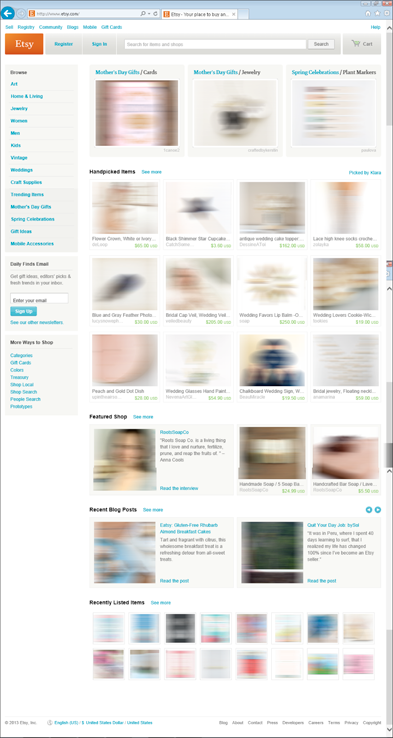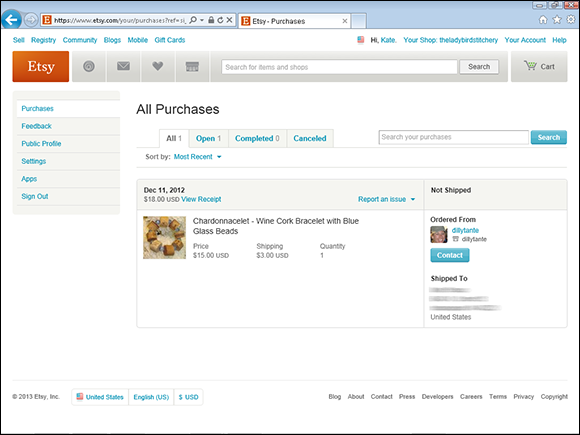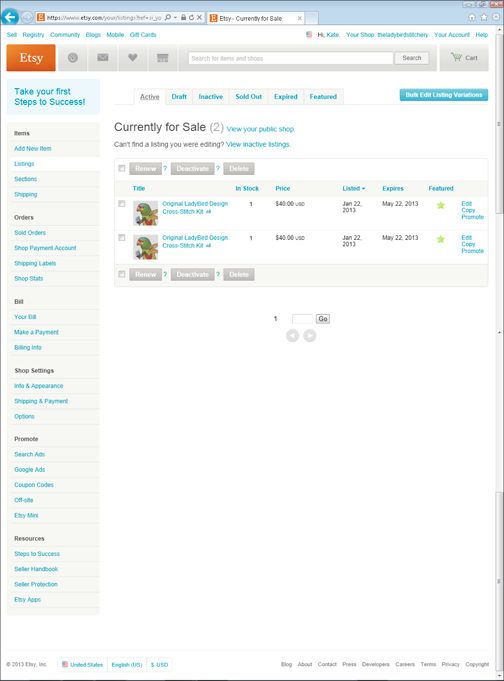Chapter 1
Handmade for Each Other: Falling in Love with Etsy
In This Chapter
![]() Understanding Etsy’s purpose and how Etsy makes money
Understanding Etsy’s purpose and how Etsy makes money
![]() Signing up for (and making your way around) Etsy
Signing up for (and making your way around) Etsy
![]() Setting up your Etsy shop
Setting up your Etsy shop
![]() Understanding the selling process on Etsy
Understanding the selling process on Etsy
![]() Running your Etsy business with ease
Running your Etsy business with ease
![]() Exploring the Etsy community
Exploring the Etsy community
If your goal is to “make a living making things,” then Etsy is for you. Etsy was created specifically to enable artists and craftspeople to sell their wares online — “to reconnect makers with buyers.” In short, Etsy enables creative types to channel their passion for their craft into their life’s work!
In this chapter, we give you a bird’s-eye view of Etsy — its purpose and business model, how to sign up for and navigate it, and all sorts of good stuff about opening and running your own shop.
Handmade Crusade: Understanding Etsy’s Purpose and Business Model
Many people think of Etsy as a sort of eBay for arts and crafts. And you can see why: People use both Etsy and eBay to buy stuff from other individuals. Also, both sites charge listing fees and make a small commission on every sale. Plus, members use feedback to rate their transactions.
But the sites have big differences, too:
![]() Although Etsy is growing — in 2012, the site boasted 22 million registered users spanning the globe and facilitated more than $895 million in transactions — it’s still the proverbial mouse to eBay’s proverbial elephant.
Although Etsy is growing — in 2012, the site boasted 22 million registered users spanning the globe and facilitated more than $895 million in transactions — it’s still the proverbial mouse to eBay’s proverbial elephant.
![]() Etsy, which launched in 2005, doesn’t use an auction format.
Etsy, which launched in 2005, doesn’t use an auction format.
![]() Perhaps the biggest difference is that whereas (almost) anything goes on eBay, Etsy was created specifically to enable artists and craftspeople to sell their handmade wares online. (Over time, the site has evolved to also allow the sale of vintage items and craft supplies; find out more about what you can and can’t sell on Etsy in Chapter 7.) Etsy itself puts it this way: “Our mission is to reimagine commerce in ways that build a more fulfilling and lasting world. We are a mindful, transparent, and humane business. We plan and build for the long term. We value craftsmanship in all we make. We believe fun should be part of everything we do. We keep it real, always.”
Perhaps the biggest difference is that whereas (almost) anything goes on eBay, Etsy was created specifically to enable artists and craftspeople to sell their handmade wares online. (Over time, the site has evolved to also allow the sale of vintage items and craft supplies; find out more about what you can and can’t sell on Etsy in Chapter 7.) Etsy itself puts it this way: “Our mission is to reimagine commerce in ways that build a more fulfilling and lasting world. We are a mindful, transparent, and humane business. We plan and build for the long term. We value craftsmanship in all we make. We believe fun should be part of everything we do. We keep it real, always.”
World Up: Introducing the World of Etsy
Just what can you do on Etsy? And how do you use it? This section scratches the surface.
Upper register: Registering with Etsy
You don’t need to register with Etsy to scope out what goodies are for sale. But if you’re in the market to buy any of said goodies — or to communicate with other Etsy members or participate in the site’s community features, such as its forums, teams, and the like — you need to create an account with the site. Fortunately, creating an account is simple and free. All you need to do is enter your name and e-mail address, and choose a username and password. You don’t even need to supply a credit card number!
If you plan to use Etsy to sell your own handmade, vintage, or supply items (and we assume you do, because you’re reading this book!), you need to take a few more steps, as well as provide a major credit card (think MasterCard, Visa, Discover, or American Express) and other vitals, such as your address.
For step-by-step coverage of completing the registration process and signing in to your Etsy account, turn to Chapter 2. Chapter 8 covers the steps you need to take to become an Etsy seller.
Homeward bound: Navigating the Etsy home page
Whether you're buying or selling, exploring or researching, Etsy's home page is your home base. It's the page that appears when you go to www.etsy.com. You can also access Etsy's home page from anywhere on the Etsy site by clicking the Etsy logo in the upper-left corner of each page.
![]() A set of links and a header bar along the top, which you can click to access various Etsy features
A set of links and a header bar along the top, which you can click to access various Etsy features
![]() Browse categories, Handpicked Items, Recently Listed Items, and More Ways to Shop, which make finding the perfect item a breeze
Browse categories, Handpicked Items, Recently Listed Items, and More Ways to Shop, which make finding the perfect item a breeze
![]() The Featured Seller and Recent Blog Posts sections, which give access to information about exceptional Etsy sellers and other important topics, respectively
The Featured Seller and Recent Blog Posts sections, which give access to information about exceptional Etsy sellers and other important topics, respectively

Figure 1-1: Etsy’s home page.
For more information about these and other home page features, check out Chapter 3.
Let us account the ways: Understanding Your Account and Your Shop
On Etsy, managing your account is easy. Etsy has grouped all the key settings and info in two easy-to-reach places: Your Account (see Figure 1-2) and Your Shop (see Figure 1-3). Your Account and Your Shop, which you access by clicking the Your Account and Your Shop links, respectively, that appear along the top of every Etsy page when you’re logged in to your Etsy account, act like instrument panels of sorts. They display all kinds of account-related info — items you’ve bought, feedback you’ve received, your public profile, your billing and shipping info, any Etsy-related apps you use, your Etsy bill, items you’ve listed, and various shop-related settings. For help with navigating Your Account and Your Shop, turn to Chapter 4.

Figure 1-2: Your Account.

Figure 1-3: Your Shop.
For sale by artist: Discovering what’s for sale on Etsy
Etsy features unique, one-of-a-kind handmade and vintage items — goodies you simply can’t find anywhere else — along with supplies for crafting your own pieces. In fact, Etsy offers an incredible breadth of items for sale, from accessories to ceramics, jewelry to quilts, and everything in between. And because there’s no middleman — you buy directly from artists and craftspeople — prices on Etsy are generally very reasonable. At the same time, your purchase can enable these skilled artisans to earn a living wage. It’s a total win-win!
Safety first: Ensuring your safety on Etsy
![]() To make sure that no one accesses your account without your authorization, you must choose a strong password. Select one that meets all the following criteria:
To make sure that no one accesses your account without your authorization, you must choose a strong password. Select one that meets all the following criteria:
• It’s at least eight characters long.
• It doesn’t contain your username or your real name.
• It doesn’t contain a complete word.
• It differs from passwords that you’ve used in the past.
• It contains a mixture of uppercase letters, lowercase letters, numbers, symbols, and spaces.
For an added layer of protection, change your password every so often — say, every 30 to 90 days.
![]() Be on the lookout for scams. These often involve the use of money orders or cashier’s checks, along with an offer to pay significantly more than is necessary to expedite shipping or to cover some other weird request. If you do get taken on Etsy, contact your financial institution on the double. Then report the situation to Etsy. You may also opt to alert your local law enforcement.
Be on the lookout for scams. These often involve the use of money orders or cashier’s checks, along with an offer to pay significantly more than is necessary to expedite shipping or to cover some other weird request. If you do get taken on Etsy, contact your financial institution on the double. Then report the situation to Etsy. You may also opt to alert your local law enforcement.
![]() Before you jump into a forum or team discussion, monitor it for a while. See whether the Etsians engaged in the discussion are people you really want to interact with. If a discussion goes south, simply disengage. Life’s stressful enough — why embroil yourself in a conflict on a site that’s supposed to be fun? Oh, and don’t share your digits or other personal deets, such as where you live or work, on Etsy’s forums or other public spaces. And if you decide to meet up with someone you’ve met on Etsy in person, pick a neutral, public place; let a friend or family member know about your plans; and be sure to bring a cellphone with you in case you need to call for help.
Before you jump into a forum or team discussion, monitor it for a while. See whether the Etsians engaged in the discussion are people you really want to interact with. If a discussion goes south, simply disengage. Life’s stressful enough — why embroil yourself in a conflict on a site that’s supposed to be fun? Oh, and don’t share your digits or other personal deets, such as where you live or work, on Etsy’s forums or other public spaces. And if you decide to meet up with someone you’ve met on Etsy in person, pick a neutral, public place; let a friend or family member know about your plans; and be sure to bring a cellphone with you in case you need to call for help.
Chapter 6 covers important safety issues in more detail.
Storefront and Center: Setting Up Your Storefront
When you set up your Etsy storefront, you can personalize it in several ways (and doing so makes a huge difference!):
![]() Uploading a banner (a graphic that runs across the top of your shop’s page)
Uploading a banner (a graphic that runs across the top of your shop’s page)
![]() Including a shop title and shop announcement to describe your shop
Including a shop title and shop announcement to describe your shop
![]() Using sections to organize your goods
Using sections to organize your goods
![]() Populating your Etsy profile and your shop’s About page, and choosing an avatar
Populating your Etsy profile and your shop’s About page, and choosing an avatar
Oh, one more pointer: As you set up your Etsy shop, you’ll want to clearly lay out your shop policies — how much you charge for shipping, whether you accept returns, and so on. We cover smart policies in Chapter 9.
Sell’s Angels: Surveying the Etsy Selling Process
1. Create the item you’re selling and determine how much it costs (with the help of the pointers we provide in Chapter 10).
2. Photograph your piece.
You can include as many as five pictures of each piece in your Etsy shop. The photos you provide must convey the shape, size, color, and texture of your piece, and also be easy on the eye.
3. Compose a snappy title and description for your item listing.
4. List your item on the site and wait for someone to snatch it up.
5. When the item sells, ship it to the buyer (after you receive your payment, of course)!
Okay, that’s a broad overview. Of course, the process has a little more to it, but trust us: It’s nothing you can’t handle. After you read Part III, you’ll be up to speed.
Takin’ Care of Business: Handling Business Matters
For some sellers, running an Etsy shop is merely a hobby — a way to make a little extra money on the side. For others, it’s their day job, or “what they do.” Regardless of which camp you’re in, you need to treat your Etsy shop as a proper small business — building a brand, marketing your shop, and providing excellent customer service.
If you’re in the latter category — someone who seeks to earn a living by selling on Etsy — you may choose to do even more. For example, you may opt to incorporate your business, obtain a business checking account, streamline your supply chain, use special tools to analyze your business, and so on.
Part IV covers all these topics and more, including how to handle tax matters and pair up with a friend to run an Etsy shop.
Community Collage: Engaging in the Etsy Community
Sure, Etsy is a great place to buy and sell handmade pieces, vintage items, and supplies. But it’s more than that: It’s a community of creative, crafty people that just begs for participation. Etsy offers several tools that help you jump right in, including these:
![]() Public message boards, called forums
Public message boards, called forums
![]() Teams, for connecting with likeminded Etsy members
Teams, for connecting with likeminded Etsy members
![]() Online Labs, which are special events where Etsy staffers and members run online seminars, workshops, shop critiques, and other educational gatherings
Online Labs, which are special events where Etsy staffers and members run online seminars, workshops, shop critiques, and other educational gatherings
You can also follow your favorite shops and sellers to keep up with their goings-on and more. And you can show your love on the site by “hearting” your beloved items and shops — that is, adding them to your favorites.
Other great resources for the Etsy community include the Etsy Blog (www.etsy.com/blog), which acts as a neighborhood newspaper of sorts. The Etsy Blog, which serves up fresh content daily, boasts material ranging from information to help you perfect various crafting techniques, to glimpses into the lives of other Etsy sellers, and more. In addition, Etsy maintains an Etsy Weddings Blog (www.etsy.com/blog/weddings), an Etsy News Blog (www.etsy.com/blog/news), and a Seller Handbook (www.etsy.com/blog/en/category/seller-handbook), as well as blogs for members in France, Germany, the Netherlands, and the United Kingdom.
Etsy’s e-mail newsletters are another great source of information and inspiration. And if you’re among the more than eleventy-jillion people who maintain a Facebook account, you can connect with Etsy there, as well as on Twitter, Pinterest, Tumblr, YouTube, iTunes, and Flickr.
Ready to dive in? Flip to Part V for all the details on engaging in the Etsy community.

 So how does Etsy’s business model work? Etsy stays afloat by charging sellers a fee for each item listed on the site. At this time, the listing fee is 20¢ per item. Etsy also collects a commission from the seller for each item sold — currently, 3.5 percent of the total price of the item, not counting shipping. In addition, Etsy collects fees (3 percent of the total price of the item plus an additional 25¢) from shopkeepers who use its handy-dandy Direct Checkout feature, which enables buyers to pay using a credit card or Etsy gift card. These fees, which you can pay using a credit card that you put on file with Etsy or using your PayPal account, are due monthly.
So how does Etsy’s business model work? Etsy stays afloat by charging sellers a fee for each item listed on the site. At this time, the listing fee is 20¢ per item. Etsy also collects a commission from the seller for each item sold — currently, 3.5 percent of the total price of the item, not counting shipping. In addition, Etsy collects fees (3 percent of the total price of the item plus an additional 25¢) from shopkeepers who use its handy-dandy Direct Checkout feature, which enables buyers to pay using a credit card or Etsy gift card. These fees, which you can pay using a credit card that you put on file with Etsy or using your PayPal account, are due monthly. To help you find a specific item, Etsy supports a robust Search tool. With it, you can search for handmade items, vintage items, and supplies. You can also use the Search tool to locate a particular shop. If you’re just browsing, you’ll appreciate Etsy’s many browsing-related features, including Categories (although rumor has it Etsy will discontinue these), Handpicked Items, Recently Listed items, the Treasury, Shop Local, and more. You access these tools from Etsy’s home page. For additional help, turn to
To help you find a specific item, Etsy supports a robust Search tool. With it, you can search for handmade items, vintage items, and supplies. You can also use the Search tool to locate a particular shop. If you’re just browsing, you’ll appreciate Etsy’s many browsing-related features, including Categories (although rumor has it Etsy will discontinue these), Handpicked Items, Recently Listed items, the Treasury, Shop Local, and more. You access these tools from Etsy’s home page. For additional help, turn to